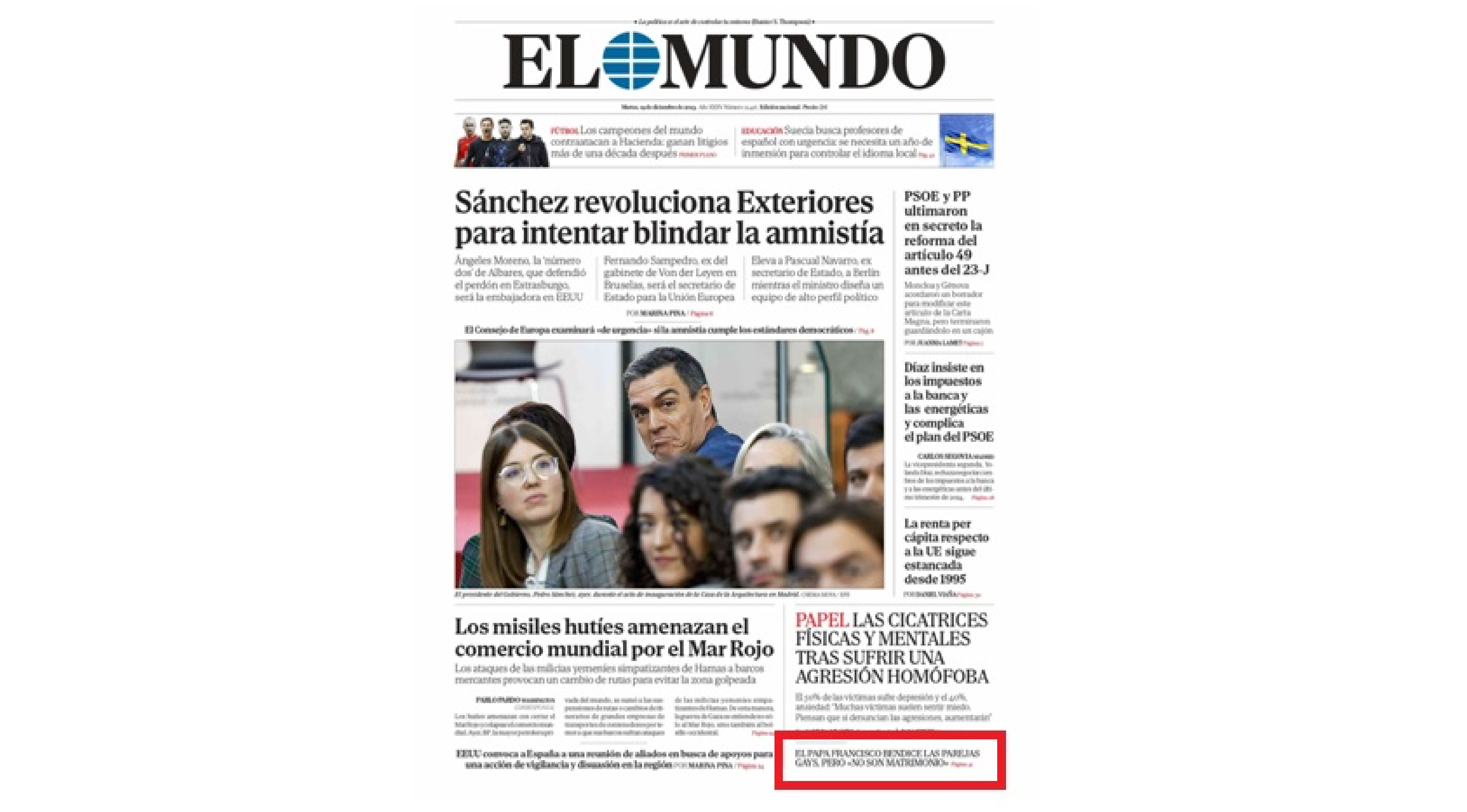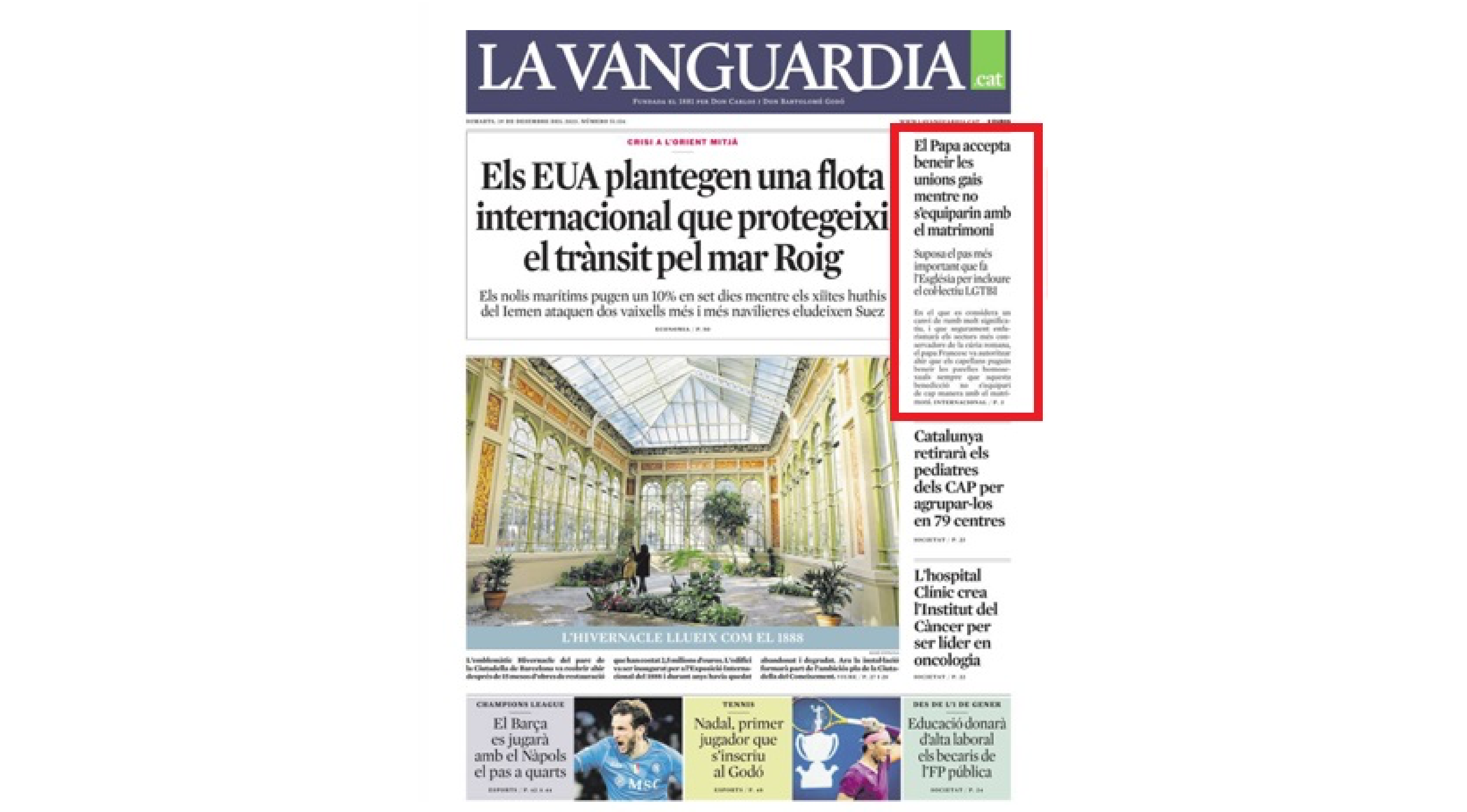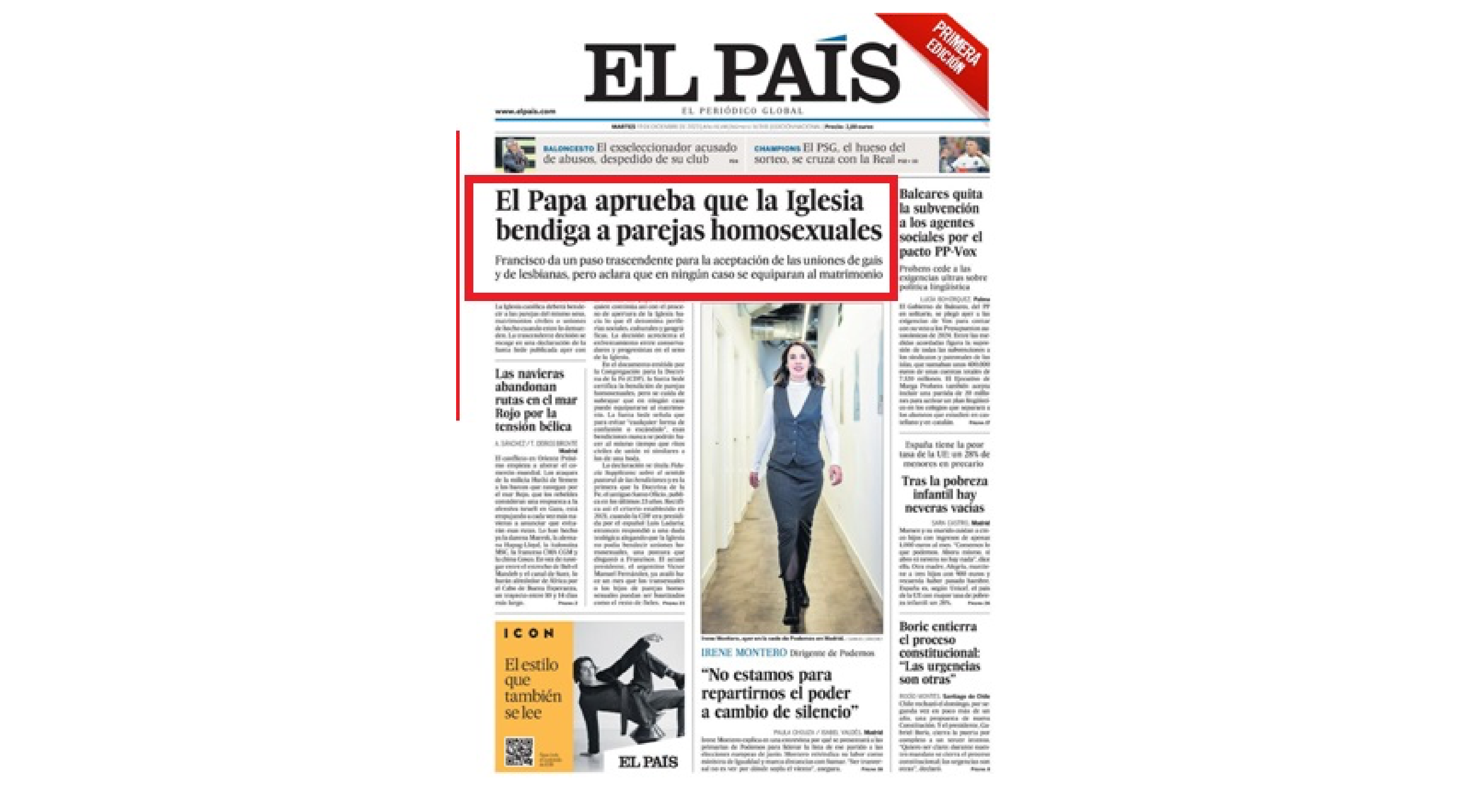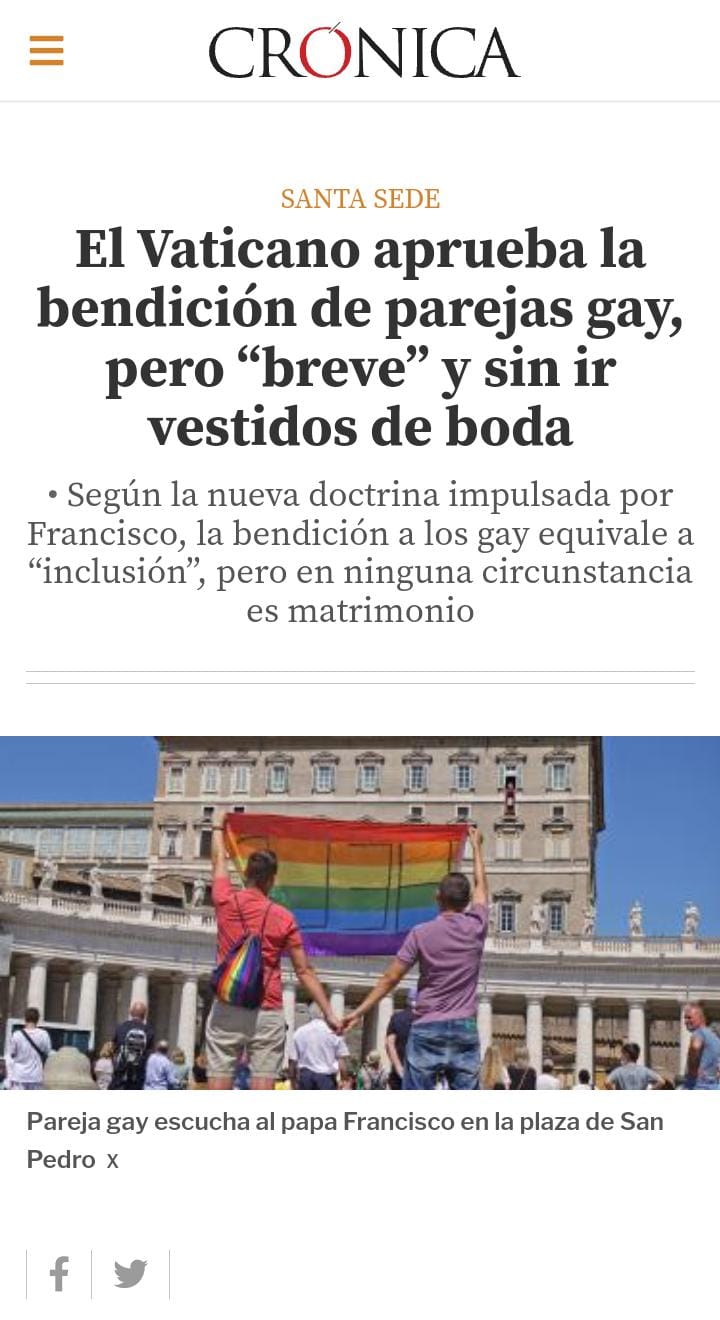(ZENIT News / Rome, 20.12.2023).- Those of us who cover information about the Holy See have an internal means of communication. A few minutes before receiving the Vatican Press Office’s press release, we were told that an additional press release was about to come out. In general press releases come out at midday, so that if an additional one was coming out it meant that it would be of some special importance. At 2:15 pm the press release arrived by e-mail with the file of the “Declaration ‘Fiducia Supplicans’ on the pastoral meaning of blessings.”
That five minutes later headlines reduced the content of an almost 11-page document to a “Vatican Approves Blessings for Homosexual Couples” was due to the widespread vice to use the search engine in the document and then put key words focused around controversial topics.
The fact that the document would have caught us of the press off-guard, led me to believe that the press was not the only one distracted: I contacted Bishops of different geographic places, they were not in the know either that a document of this type was about to be published. In other times of the history of Vatican communication “controversial” documents were reported to the Episcopal Conferences or directly to the Bishops, so that they would have the time to prepare themselves to give answers, not only to the local media but first to their own flock, including priests.
Understood in this context is that the first pronouncements were delayed in coming out and that, little by little they were diversifying, and that diversification oscillates between acceptance and rejection.
Acceptance: The U.S. and German Episcopates Were the First to Position Themselves
The U.S. Episcopal Conference was one of the first to issue a statement. The spokesman said:
“The Declaration issued today by the Vatican’s Dicastery for the Doctrine of the Faith (DDF) articulated a distinction between liturgical (sacramental) blessings and pastoral blessings, which can be given to persons who desire the loving grace of God in their lives. The teaching of the Church on marriage has not changed, and this Declaration affirms it, at the same time that an effort is made to accompany persons by imparting pastoral blessings, because each one of us needs the healing love and mercy of God in our lives.”

Another Episcopal Conference that issued a press release soon was the German. The President of the German Episcopate, Monsignor Georg Bätzing, took on the task to express the following:
“I receive this document with great satisfaction and I am grateful for the pastoral perspective it adopts. Fiducia Supplicans explains that, in principle, it is possible and licit that the ordained Pastor responds to the desires of couples that ask for a blessing for their union, although they don’t live according to the rules of the Church in all aspects. This means that a blessing can be given to couples that cannot marry in the Church due to a divorce, for example, and to same-sex couples. The Church’s practice recognizes different forms of blessing. It’s good that this treasure is now unearthed for the diversity of styles of life. The text affirms that the blessings can be considered “one oof the most widespread sacramentals and in constant evolution.” The Dicastery for the Doctrine of the Faith stresses the clear distinction of a sacramental blessing in the context of the ecclesiastical nuptial ceremony and stresses the need not to blur this difference in any case. On the other hand, however, the text underscores the pastoral meaning of a blessing that cannot be denied in response to a personal petition.
The fact that this text gives great importance to the specific distinction between the blessing and sacramental marriage, is undoubtedly in consonance with the carefully exercised responsibility by the Dicastery in relation with the Doctrine of the Faith. According to the Catholic Doctrine, marriage, the permanent and indissoluble union between a man and a woman open to offspring, is a Sacrament that the spouses confer on one another and that is sealed with the blessing of the Church.
The petition of the spouses of a blessing for themselves and for their journey together corresponds to a petition of blessing that is anchored in many ways in the traditions of Catholic popular piety and it refers to all those realms of life that people consider particularly important for them. To ask for a blessing is a gesture of humility towards God in which people express that they entrust themselves to God’s goodness. Promised in the blessings is the love of God as reinforcement in life’s journey. The Declaration affirms that the same moral conditions that are exacted for the reception of the Sacraments do not need or can be exacted to give a simple blessing.
The Fiducia Supplicans Declaration addresses the questions that have been manifested in the recent past around the subject of petitions of blessing and blessings from a pastoral perspective and in a theologically moderate language and without agitations. The Declaration applies categories and terms in a responsible way. It draws a clear line between unbreakable fidelity to the teachings of the Church and the pastoral exigencies of an ecclesial practice that wishes to be close to people. Described here is a margin of pastoral maneuver that clarifies responsible ecclesial practice.
Underscored expressly at the end of the Declaration is that: “The framework showed here is sufficiently clear to give ordained ministers the necessary safety of action.”
The Swiss Episcopal Conference issued a press release, which stated that “The Vatican’s decision to authorize the blessing of same-sex couples ‘corresponds to the wish of the Swiss Bishops for an open Church which takes seriously, respects and accompanies people in different relational situations.’” The Canadian Bishops issued a statement of the President, Monsignor William McGrattan:
“On December 18, 2023, the Dicastery for the Doctrine of the Faith published the Fiducia Supplicans Declaration, which responds to the questions that were posed on the possibility of offering blessings to persons that live in irregular unions, including the relations between same-sex persons. While stating explicitly the Church’s traditional concept of marriage, Fiducia Supplicans allows parish priests to bless persons that request it freely, seeking divine help to live in fidelity to the Will of God. The Declaration clarifies that such blessings must be directed to the persons themselves and not to their situation, and that they must be requested spontaneously and are not ritual or liturgical actions.
The ruling principle of the Declaration is the fact that the request for a blessing itself represents an openness to God’s mercy and can be an occasion of greater trust in God.”

The Catholic Church of Mexico, the second country with the largest number of Catholics in the world, also published a press release, stating:
The recent “Fiducia Supplicans Declaration” of December 18, 2023 of the same Congregation, now Dicastery, affirms with all clarity that: “rites and prayers are inadmissible that might create confusion between what is constitutive of marriage, as “exclusive, stable and indissoluble union between a man and a woman, naturally open to engender children,” and what contradicts it. This conviction is founded on the perennial Doctrine of the Church on marriage. Only in this context do sexual relations find their natural, appropriate and fully human meaning. The Doctrine of the Church on this point remains firm.
However, the recent Declaration, taking into account the rich pastoral tradition of the Church, points out that informal blessings can be imparted — not ritualized liturgically –, in an infinity of situations of the different human realities, as sign of our praise and gratitude to God and as openness to His grace and mercy, in such a way that, the blessing that people in irregular situations can ask for, the Church grants as a gesture of closeness and accompaniment, to help them to “mature and grow in fidelity to the message of the Gospel, to free themselves from their imperfections and fragilities and express themselves in the ever greater dimension of divine love.”
Therefore, although unions that contradict the Doctrine on Marriage cannot be blessed ritually, non-liturgical prayers can be offered to those that request them with a spirit of faith and openness, without the desire to legitimize irregular situations, but as expression of the pastoral mercy of Christ and of the Church to every person.
As Mexican Episcopate, we express our communion with the Holy Father, following his guidelines to foster pastoral charity in the proclamation of the Gospel and we exhort, both priests and pastoral agents as well as the faithful in general, not to generate confusion or detract from the pastoral sense of what Pope Francis requests, that is, an attitude of welcome, closeness and discernment to those that request a blessing, guiding them with delicacy, firmness and clarity in their journey to fulfil God’s Will in their lives.
Another of the most numerous Churches of the planet, the Catholic Church in the Philippines, issued a communication signed by the spokesman, which highlighted:
The document speaks for itself and, therefore, does not require much explanation. In fact, in paragraph 41 it says: “What has been said in this Declaration regarding the blessings of same-sex couples is sufficient to guide the prudent and fatherly discernment of ordained ministers in this regard. Thus, beyond the guidance provided above, no further responses should be expected about possible ways to regulate details or practicalities regarding blessings of this type.”
The document has an Introduction where the Prefect of the said Dicastery, Victor Manuel Cardinal Fernandez points out that “this Declaration remains firm on the traditional doctrine of the Church on marriage, not allowing any type of liturgical rite or blessing similar to a liturgical rite, which can create confusion.” What Cardinal Fernandez considers as unique value of this document is that “. . . it offers a specific and innovative contribution of the classical understanding of blessings . . . “

Rejection: From Casting Doubt on the Document to Prohibition of What the Document Says
However, not all the Episcopates reacted in the same way. In Denmark, the Bishop of Copenhagen, Monsignor Czeslaw Kozon, expressed his disagreement with the substance and form with which the document of the Dicastery for the Faith will be received. In the neighbour country, Bishop Jan Hendricks of Haarlem-Amsterdam, preferred to playdown the importance of the Declaration and said they should ask him in January.
But other Episcopal Conferences and Archdioceses have not hesitated to be frontal and answer the Declaration of the Doctrine of the Faith: the Episcopal Conference of Malawi determined that blessings of all types , or homosexual unions of any nature are not permitted in the country. The Episcopal Conference of Kenya lamented the confusion among the People of God and clarified that Kenya is very clear on what a family and marriage is. Another Episcopal Conference, that of Zambia, challenged the need to implement the document and said that what is needed is to discuss it, specifying:
“In order to avoid any pastoral confusion and ambiguity, as well as to break the law of the country which forbids same-sex unions and activities, and, while listening to our cultural heritage, which does not accept same-sex relationships, the Conference guides that the Declaration from the Dicastery for the Doctrine of the Faith of December 18th , 2023, concerning the blessing of same-sex couples be taken as for further reflection and not for implementation in Zambia.”
Finally, “the Catholic Bishops Conference of Nigeria (CBCN) “assures the entire People of God that the teaching of the Catholic Church on marriage remains the same. There is, therefore, no possibility in the Church of blessing same-sex unions and activities. That would go against God’s law, the teachings of the Church, the laws of our nation and the cultural sensibilities of our people. The CBCN thanks all the Priests for their accompaniment of married couples, asking them to continue in all they do to sustain the Sacrament of holy matrimony and never do anything that would detract from the sacredness of this Sacrament.
In Europe, the Ukrainian Conference said that the Declaration poses a “danger due to its ambiguous formulation, which causes divergent interpretations among the faithful.”
The harshest reply came from Kazakhstan, where both the Titular Archbishop of Astana, Tomash Peta, as well as the Auxiliary, Athanasius Schneider, said that the Document of the Dicastery for the Doctrine of the Faith contradicts “divine revelation and the uninterrupted doctrine and practice of two thousand years” of the Catholic Church. Moreover, they forbid “the priests and faithful of the Archdiocese of Saint Mary of Astana to accept or engage in any form of blessing of any type of irregular couples and same-sex couples.” Outstanding is a passage of the press release, where the Pope is corrected:
“With sincere fraternal love, and with due respect, we address Pope Francis who, by allowing the blessings of couples in an irregular situation and same-sex couples, “does not walk straight in keeping with the truth of the Gospel (see Galatians 2:14), to borrow the words with which Saint Paul the Apostle publicly reprimanded the first Pope in Antioch. Therefore, in the spirit of episcopal collegiality, we ask Pope Francis to revoke the permission to bless couples in irregular situations and same-sex couples, so that the Catholic Church can shine clearly as “pillar and bulwark of the truth” (1 Timothy 3:15) for all those that sincerely seek to know the Will of God and, by fulfilling it, attain eternal life.”

The answer is more open on the social networks where, between December 18-20 the topic has been a trend. There are Bishops and many priests, who in their personal capacity have answered the Roman Pontiff (whereas in a smaller number there are those that defend him). In some American dioceses an avalanche is looming of implementations of the document of the Doctrine of the Faith in keeping with the sensibility each Pastor: CAN reported that:
“In the Diocese of Crookston, Minnesota, Bishop Andrew Cozzens emphasized the reaffirmation of the Catholic Doctrine that defines marriage as between a man and a woman, which, he said, “is rooted in the Gospel we have received from Jesus Christ” and, therefore, “is unchangeable.” Cozzens noted that Christ responds to sinners who open their hearts to Him “with mercy and inviting them to deeper repentance and discipleship, but also noted that Christ calls them to “repentance and conversion.”
Cardinal Sean O’Malley of the Archdiocese of Boston, similarly noted in a statement that priests must be careful to ensure that any pastoral blessing does not resemble a liturgical act, noting that Church teaching on marriage has not changed and that the Vatican document teaches that “all Catholics, including those whose unions are not recognized by the Church, are equally in need of God’s grace and love.”
“The document . . . offers a type of blessing that can be conferred on anyone to invoke God’s help and mercy in their lives ,” said Cardinal O’Malley, according to the Boston Pilot. “It is the Church reaching out a hand of affection to all Catholics in the hope that these simple gestures provide an effective means of increasing trust in God on the part of the people who seek to be guided by a greater understanding of God’s plan for love and truth.”
The Diocese of Green Bay, Wisconsin, issued a statement that also emphasized the unchanging Catholic Doctrine that marriage is between a man and a woman.
“The Church’s teaching on marriage has not changed, and this Declaration affirms that, while also making an effort to accompany people through the imparting of pastoral blessings because each of us needs God’s healing love and mercy in our lives,” the Statement read, according to WBAY.
Some of the media highlight the conflict that now arises in dioceses where the priests go in one direction and the Bishops in another (Ullmann case, Austria case, for example).
From a strictly communicative point of view, the question seem fair: Could the reception of a document of this nature been prepared? Because the reactions seem to call for an answer.



